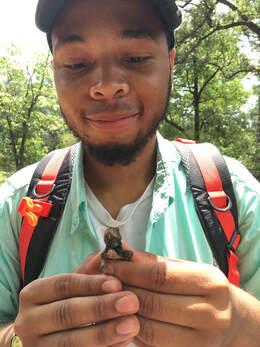|
Cameron Venable PhD Email: [email protected] Office: 508 Mueller Laboratory Phone: 814.867.2252 Curriculum Vitae Education BSc 2014 Lebanon Valley College PhD 2019 The Pennsylvania State University Research Interests I want to understand how, if, and when animals are able to adapt to their environment - especially when it comes to invasive species. My dissertation research at Penn State focused on how a native predator (the eastern fence lizard) behaviorally responds to invasive prey (the red imported fire ant). This work revealed that lizards can learn to avoid invasive toxic prey and preferentially consume palatable native species, though this ability differs across a lizard's life history. I also showed that lizards that learn to avoid consuming invasive prey subsequently avoid the consumption of palatable native ant species, which could dramatically decrease the lizard's prey pool and have far-reaching ecological consequences. Moving forward, I plan to explore how behavioral responses of native species to invaders could have trophic level consequences via cascading effects (e.g trait-mediated indirect interactions). So stay tuned. . . Presentations 2019 Eating toxic invasive ants turns lizards off native ants. Society of Integrative and Comparative Biology Meeting – Tampa, FL. Venable CP and Langkilde T. The Effects of Invasive Prey on Native Predators. Lebanon Valley College, Annville, PA. 2018 Gordon Research Conference: Predator-Prey interactions , Ventura, CA. Learned aversion of invasive prey in juvenile lizards. Venable CP, Adams TA and Langkilde T. Society of Integrative and Comparative Biology, San Francisco, CA. Choice may influence native predator consumption of invasive prey. Venable CP, Adams TA and Langkilde T. 2017 Society of Integrative and Comparative Biology, New Orleans, LA. Choosing a meal: Lizards differentially kill and consume native versus invasive ants. Venable CP and Langkilde T. |
Publications
Venable C.P., Adams T.S., and Langkilde T. 2019. Aversion learning in response to an invasive venomous prey depends on stimulus strength. Biological Invasions 21: 1973-1980 https://doi.org/10.1007/s10530-019-01949-3 Venable, C.P. and Langkilde T. 2018. Lizards display an ontogenetic shift in relative consumption of native and invasive prey. Canadian Journal of Zoology 97: 419-423. https://doi.org/10.1139/cjz-2018-0228 Venable, C.P. and Langkilde T. Eating toxic invasive ants reduces subsequent consumption of native ants by a lizard. In prep. Venable, C.P. and Langkilde T. What determines differential consumption of native and invasive ant species by a lizard? In prep. Awards
2018 Alfred P. Sloan Scholar Carl Storm Underrepresented Minority Fellowship 2017 Charlotte Magnum Student Support Award 2014 Button-Waller Biology Fellowship Lebanon Valley College O. Pass Bollinger Environmental Biology award 2013 Sigma Xi Grant recipient Lebanon Valley College Arnold Grant recipient 2012 American Society of Plant Biologist Student Undergraduate Research Fellowship program honorable mention recipient |
